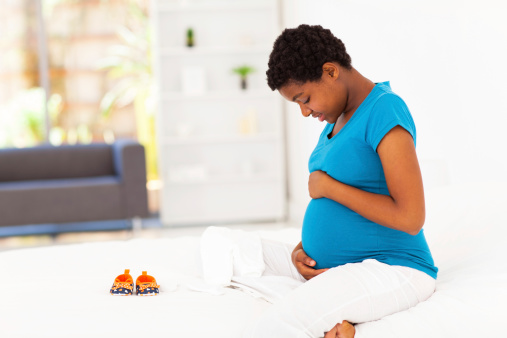Do we really shroud something so joyous (and potentially heartbreaking) in secrecy because…it might be awkward?
You’re idly scanning your Facebook feed, past photos of organic seedlings and Andalusian beer, when suddenly a black-and-white splotch claims top spot. Your first thought: Christ on a stick! My friend is pregnant with an out of focus baby! Your second:How did they keep that secret for 12 weeks?
And…why?
On one level, we know why: The first trimester of pregnancy is when women are most likely to miscarry. Presumably, announcing a pregnancy only to have to unannounce it is not a pleasant experience. But what if it was a normal one? Do we really shroud something so joyous (and potentially heartbreaking) in secrecy because…it might be awkward?
“Historically, we thought the whole child-bearing process was solely a woman’s responsibility,” says Donna, a midwife with 10 years of experience. “Women dealt with miscarriage privately. But as midwives, we now tell people there’s no good reason to have to wait to tell people anymore. Yes, there are various things to watch for, but there’s already so much guilt around pregnancy and motherhood—at least now if you do have a miscarriage, it involves men and families.”
“It used to be that even late pregnancy was a bit unseemly,” says psychologist Julie Houniet. “We’ve come a long way from the Victorian era, but the idea persists that if something has gone wrong that’s best not discussed.”
Some women, like mother of two Kathy Winton, prefer to tell people straight away, but feel constrained by the expectation that ‘it’s just not done.’
“In your first pregnancy, you tend to do what others say without questioning it,” says Winton. “I was so excited, but I felt guilty telling people, like ‘It’s just not what we do’—I had this fear of going against the social norm.”
Social norms play more of a role than we realise, according to Houniet. “Thankfully, cultural delicacy around pregnancy is disappearing. Ten years ago, I was amazed to see pregnant women in Europe in bikinis, now it’s something to be celebrated. And though our whole approach to pregnancy complications and grief has evolved significantly over past decades, we still have a long way to go.”
When performer Queenie van de Zandt got pregnant, those around her warned her against being open about it. “They’d say things like ‘Be careful, it’s too private,’ ‘You’ll get fired,’ or ‘If something happens, you’ll have to tell people.’ I just thought ‘Why shouldn’t I tell?’ I was excited! I much prefer to share what’s really going on anyway, and it felt horrible not being open. In the end I thought ‘Screw it, I’m not going to sneak around with morning sickness, or cover up that I’m having a hard time if anything bad does happen.”
Sadly, van de Zandt did eventually miscarry. But she is adamant that her decision to tell people early made the experience less, not more, distressing. “I can’t imagine not having told people and going back to work and dealing with this stuff without colleagues knowing. So many people opened up, and told me their own stories. That sort of stuff is lovely because you don’t feel alone.”
“People aren’t always all that appropriate with grief anyway, let alone miscarriage,” says Houniet. “Yes, some prefer to grieve privately, but when that’s done—because of attitudes about how it ‘should’ be private—it can cause more damage. We call it ‘disenfranchised grief’—it actually drives the loss further into the person, and makes it harder to process.”
For van de Zandt, being open from the beginning meant she felt much more supported when something did go wrong. “People’s capacity for empathy is heightened if they already know you were pregnant,” she says. “By only telling the good stuff, we do ourselves a great disservice.”
And when you’re open about your story and your grief, it gives other people permission to do the same.
“You hear the truth of other people’s lives and realize others aren’t perfect. But most of all you realize you’re not alone.”
Alice Williams is a Melbourne author and yoga teacher.
This originally appeared on The Daily Life. Republished here with permission.
Related Links:

